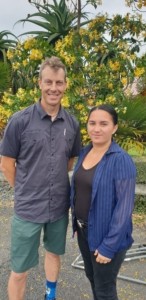
NEW NURSES: Ryan Thompson and Karnisha Waru are two of the 24 EIT Tairāwhiti Bachelor of Nursing graduands who have been offered jobs with Hauora Tairāwhiti or external primary care health services in this region.
For the first time, all 24 EIT Tairāwhiti 2019 nursing graduands who applied to the Advanced Choice of Employment programme (ACE) have been offered jobs with Hauora Tairāwhiti or external primary care health services in this region.
Bachelor of Nursing programme site coordinator Adrianna Grogan says this class of students have been amazing.
While the majority of students have been offered work over the past 15 years Mrs Grogan, this was the first year all graduates who had applied through ACE had been offered a job. She was not surprised as this year’s class was “special”.
“There was something about them. At the final luncheon, all the lecturers said they knew from the start of the three-year-degree programme it was a special class.
“They were cohesive and were not afraid to challenge us – they have had real drive.
“They have been amazing as a group.”
They showed real empathy – for example, after the March 15 terror attack, they sent a box of food to nurses in Christchurch to support them.”
They are a diverse group with two males and the rest female, and there is also a good mix of ethnicity among them with 10 who identify as Māori, two Indian, one Samoan, and one Tongan.
The job offer for the 24 students is conditional that students pass their final state exam. Results are due December 13 and Mrs Grogan is expecting them all to pass.
The staff also work hard to ensure the Bachelor of Nursing programme is as whānau-friendly as possible.
“We try hard to make sure classes are 9-3 to cater for parents, making the timetable as friendly as possible so it gives Mums (or Dads) with children a second chance at a career.”
A real positive community outcome of the programme is the students are people who are already committed to this district.
“And they are going into work back in our area.”
One of the students Karnisha Waru, 23, is looking forward to her career after having a child at the age of 16.
“I wanted to give my daughter a better life and provide financial stability.”
She also had real life experience that led her into nursing.
“My Dad had renal failure and I followed his journey which saw him have a kidney transplant.”
Karnisha says it was great to be able to study at home and have the family alongside supporting her.
A highlight has been self learning and growing.
For one of the two male students, Ryan Thompson, taking up nursing has been a complete career change.
“I followed my heart into nursing … even though it is late in life. I was a builder and decided to do something different. Next year I am graduating at the age of 49 – proving it is never too late to make a change.”
He has been offered a job in Accident and Emergency and is looking forward to the high pressure in an acute setting.
Originally from the United States of America, he moved here about eight years ago and now calls Tairāwhiti home with his wife and children.
A highlight was doing a five-week placement in an Aboriginal family practice clinic in Alice Springs, Australia.
The experience in the nurse-run clinic with no doctor support was an “eye opener” and a “neat experience”.
He says his learning there transfers to what happens up the coast here.
The nursing programme for him was fantastic.
“I loved it. Being isolated gave us the opportunity to learn more laterally and gave us more options than we might have got in other areas. Also the flexibility meant I could do volunteer ambulance training with St Johns alongside doing the course.”
Both Karnisha and Ryan agree, the class was a great bunch of people who supported each other all the way through.
For people here wanting to do the course, there is a scholarship for students coming straight from school meaning a year of free learning. Also the Government offers one year fees-free, so for some it can be two years fees-free.
People are encouraged to apply by October each year and student numbers for next year’s intake are looking promising for another bumper year.
Mrs Grogan says the first year is a grounding in sciences, academic writing and nursing skills. There are two placements, one in an aged residential care facility and one within the Tairāwhiti DHB.
The second year sees study into pathophysiology, long term and acute health conditions and two clinical placements in hospital in medical/surgical wards as well as mental health.
In the third year students undertake a primary health course with agencies in the community, a pharmacology course and a contemporary issues course. In the last semester students complete a transition course and select an area they want to work. The final placement is for nine weeks.
Mrs Grogan says the programme is reliant on the support of the local DHB and external health care provider for placements each year.
“We are really grateful for the amazing support given to the students to help them graduate and register as nurses.
“I must acknowledge the accord of the commitment between DHBs and NZNO (part of the Multiple Employer Collective Agreement (MECA) negotiations) of full employment of new graduates.

